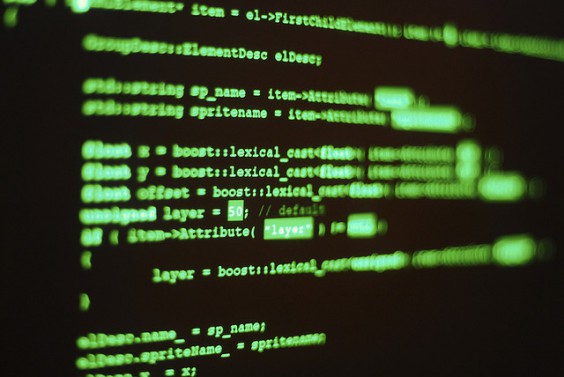“Unknown Hackers” as a New Year Miracle for Belarusian Authorities
by Michał Janczuk / January 12, 2015 / No comments
The Belarusian government has begun a new initiative to suppress free media, and created the enemy they need to further their censorship.

Hackers -- likely created by the Belarusian government -- began attacking independent media sites prior to the implementation of a new law restricting press freedom. Photo via Flickr user: sbengineer.
A good economy is the best policy. When something goes wrong with the economy in Belarus, our government usually has two ways of dealing with it: either to improve the economic situation (which they do rather rarely) or to attack “the sowers of panic” (which they do always). This Christmas wasn’t a very pleasant time for the Belarusian government. The dollars and euros that had been freely flowing inside the country almost came to an end, as the result of the Russian economic crisis and the more than fifty percent devaluation of the Russian ruble in the last two months of 2014.

- Belarus is called the “geographical center of Europe” by its dictator-president. It’s true only if you situate the eastern border of Europe in the Ural Mountains, deep in Russia. I rather doubt we are the center of our continent – but we still could be its good border. Now we just need the simplest thing ever – to build a sustainable, democratic Western-style country after 70 years of Soviet occupation and 20 years under authoritarian regime. Piece of cake. But some of us still believe – it’s always darkest before the dawn.

- Michał Janczuk is a reporter for the independent television station Belsat. In the seven years since Belsat was founded, secret police have raided it four times, destroying their infrastructure inside the country. Janczuk has been denied journalistic accreditation, and is forced to work within Belarus illegally. In 2012, he and a fellow journalist were barred from exiting Belarus. Now able to come and go from his country freely, he still faces the threat of being charged with “unlawful production and dissemination of information.”
Rationally speaking, if fifty percent of our Belarusian GDP comes from trading with Russia, then the collapse of the Russian ruble must inevitably lead to the same thing with the Belarusian ruble, causing a huge demand for Euros and US dollars. How can the government prevent people from acting rationally and buying Euros and US dollars? Like the Argentinian government last year, the Belarusian government decided, “Let’s make hidden devaluation!” They allow people to buy dollars, but at a thirty percent increase from before the ruble’s collapse, while the selling price remains the same.
Will this solve the problem of currency demand? Only in the short term. But it immediately creates a huge black market for dollars and euros, almost eliminating banks from exchange process. (It’s such a pity for the government that people are rational beings!) And there’s one additional problem: the independent press will not allow the authorities to make fools of all of us. Usually after such “brilliant economic measures,” the Belarusian dictatorship begins a campaign to repress the free media. But this time, Lukashenko‘s people went one step further.
On December 17th, one day before this hidden devaluation, the Belarusian parliament accepted a very substantial amendment to the national media law. It took just few hours, from creating the project in the Ministry of Information, to completing the process of two votes in the House of Representatives. How nice! No discussion with anybody! We, as a journalistic community, awoke the next day to a totally different professional situation.
Thanks to the amendment, the government has the right to block ANY Internet site or ban printed media, without a court decision, if the publication contains information that could affect Belarus’s national interests. Not lies, just INFORMATION. Information, for example, like the truth about stupidity of the freshly undertaken economical steps, supplemented with numbers, figures, and arguments by independent economists.
But the guys up top had one additional problem: the accepted law, signed by the president on the 20th of December, had a vacatio legis until January 1, 2015. “Oh gosh,” the government officials must have wondered. “What will we do with this?” Let the magic begin! Suddenly, “unknown hackers” began to appear on stage. They started to attack Belarusian media sites. But only the sites of independent publications and media; all those controlled by the government remained unharmed. The biggest independent news agency, BelaPAN, the Internet newspaper Solidarity, and the biggest opposition news portals, like Charter97.org, Naviny.by, and Belaruspartisan.org are all offline inside the country.
All attempts to ping and trace routes show that access is being blocked on the level of the state-owned backbone Belpak (we have a state monopoly on internet backbones. Surprising, huh?) The officials accused the “unknown hackers” and made big, innocent eyes. Every attempt by the blocked sites to change the IP-address and avoid further blockades ended the same way: with a follow-up attack by the “unknown hackers,” which brought the site down.
We – as a Belarusian journalists community – had only until the end of 2014 to complain about this unlawful situation. Why just few days? Because, I’m absolutely sure that on January 1, all of these “unknown hackers” disappeared. Vacatio legis came to an end, and the government can now block all these sites completely lawfully, without a court decision. After two blocks, they will have the right to close the Internet site or web publication. All of this, just to protect the brains of Belarusian people from “sowers of panic.” Happy New Year, as 2015 begins without free information to all!




